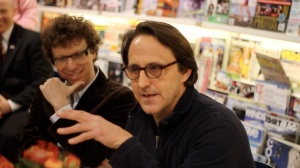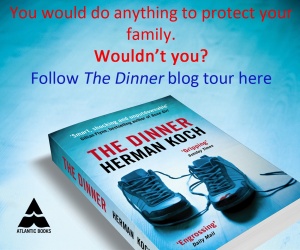Have you been following this week’s blog tour of Herman Koch’s The Dinner? This is the final stop and I’m delighted to be discussing this book as well as other matters of Dutch literary translation with Koch’s translator, Sam Garrett.

Copyright Pascale Bonnier
1) How did you become a literary translator?
While working as a correspondent for a press agency in The Hague, I began translating some short stories I came across in magazines and anthologies. I showed a few to a publisher, who encouraged me to go on. After a while some of those stories got published in literary journals in the States and Canada. From there on out I tried to seize every opportunity to translate literature that interested me, and finally that became my profession.
2) How did you obtain the commission to translate The Dinner?
Marijke Nagtegaal, who used to be the foreign rights manager at Koch’s publishing house, called and asked if I’d be interested in doing the book. I said yes. She recommended me to Ravi Mirchandani at Atlantic, who had just – wisely enough – bought the world English-language rights to the book.
3) How long did it take you to translate the book? What were the particular challenges in translating this book?
About eight months, I believe. The real challenge was to find the American equivalent of the voice of the narrator, Paul Lohman, and to curb my own unconscious tendency to gild the lily.
4) Were there any passages where you needed to be creative because the Dutch idiom didn’t translate easily to English?
Well, there’s plenty of nasty humor in The Dinner. And if you don’t keep it nasty and funny, then you’ve already got three strikes against you. A passage that was a little tricky, but which turned out to be one of my favorites, is the Straw Dogs reference:
The actress looked me over from head to toe before speaking.
“Your wife tells me you will be leaving us tomorrow.” Her voice had something artificially sweet to it, like the substance in Diet Coke, or the filling they use in diabetic chocolates, which say on the package that they won’t make you fat. I looked at Claire, who rolled her eyes slightly, up at the star-studded sky. “And that you’re going to Spain, of all places.”
I thought about one of my favorite scenes from Straw Dogs. What would this artificial voice sound like if its owner were to be dragged into a barn by a pair of drunken French bricklayers? So drunk they could no longer tell the difference between a woman and the ruins of a cottage with only the walls still standing. Would she still be shooting her mouth off when the bricklayers set about rectifying her foundation? Would the voice come loose of its own accord once it was being peeled off, layer by layer?
The Dutch says: “Zou ze haar tekst nog weten op het moment dat de metselaars het achterstallige onderhoud ter hand zouden nemen.” I remember thinking about the “metselaars” and about that “achterstallig onderhoud”. The word “masons” is too bland and too ambiguous in the wrong way, so I chose “bricklayers”, which sounds sort of dumpy and has the advantage of the right kind of veiled double-entendre. That “achterstallige onderhoud ter hand nemen”, with its reverberations of “achterwerk”, backside, and hands everywhere, led me to “rectifying” with its reverberation of “rectum” and so of anal sex. And what might one perhaps rectify? Foundation sounded right, and besides the connotation of “nether parts” it had the advantage of being close to “foundation garment”, which is something I think this particular aging actress might wear. “Back maintenance” wouldn’t have done any of that for me, probably not for the reader either. So it’s Herman Koch’s darkly humorous comment, and I’m kind of riffing on it.
5) You’ve won the Vondel Prize for Dutch-English translation twice. (The Rider – 2007 and Ararat, In Search of the Mythical Mountain -2009). Is translating non-fiction different to translating fiction? Do you need to research the non-fiction first to become acquainted with the vocabulary and concepts or do you do the research as you go along?
Translating non-fiction definitely involves an incredible amount of research, yes. I tend to do that research as I go along: fact-checking, consulting background material, plenty of side-reading.
The actual work itself, though, is very like that involved in translating fiction. The same set of tools, the same sensibilities.
6) What’s the most interesting piece of research you had to undertake?
The most interesting research, I believe, was the work I did alongside translating The Rain Bird by Jan Brokken. I read all about the great explorers: Henry Morton Stanley, Du Chaillu, Count Brazza, Albert Schweitzer, you name it. Africa has always triggered my imagination, so that was enormously interesting.
7) Which book was the most challenging to translate and why?
It would have to be a toss-up between In Europe by Geert Mak and Congo by David Van Reybrouck. Both brilliant works of non-fiction, but lengthy and ambitious, packed not only with facts, but also with subtle turns of phrase.
8) Do you have a favourite amongst your translations and why?
My translation of Tim Krabbé’s The Rider is still dear to me. I actually did a lot of cycling while I was translating that, and paid a lot of attention to bicycle racing and training methods, etc. The preparation for the translation itself, in other words, was an adventure and lots of fun. And the book itself was a joy, something I’d been dreaming of translating for years. It all just came together in almost every way imaginable.
9) The blogosphere will be celebrating Dutch Literature Month in June. Which three works of Dutch/Flemish literature (preferably translated into English but not necessarily so) would you recommend we bloggers read?
The Misfortunates – Dimitri Verhulst (Portobello)
Caesarion – Tommy Wieringa (Portobello)
Tirza – Arnon Grunberg (Open Letter)
10) You are stranded on the proverbial desert island and you are allowed one book to take for translation purposes. Which would it be and why?
De Avonden by Gerard Reve. A seminal novel in modern Dutch literature, revered by all but never translated – for a host of reasons. For me, as an American trying to enter Dutch culture, that novel served as a key to a new world, as an explanation for why Sundays in Amsterdam used to be so dreadfully quiet (they’re not anymore), a funny and at the same time relentlessly bleak portrait of a young man of the variety square-peg-in-a-round-hole, living in the Dutch capital just after the close of the Second World War. And to translate it and translate it well, you’d need the kind of time you might only have on your hands after being tossed ashore on a desert island.
———————————
A fitting finale to the blog tour, I hope you agree. I’m also hoping it persuades you to join in Iris’s recently announced Dutch Literature Fortnight. And as a sweetener I have a copy of The Dinner to giveaway. Scroll down to the post below to enter. Can’t make your mind up? See what the other blog tour participants had to say:
Words of Mercury
Winston’s Dad
Tripfiction
Follow The Thread
Reading in the Sunshine

Really nice interview! I love to find out about the back grounds of translation. I (re)read The Dinner recently (review on my blog soon) and I loved it (more than last time, even).
I hope Sam Garrett gets to translate ‘De Avonden’ br Gerard Reve of which he say ‘revered by all, but never translated’.
I’ve just found your blog. Great interview! Thanks 🙂
wonderful insight ,all the best stu
Sam Garrett’s translation is excellent! I don’t know Dutch, but I worked as a Russian-to-English translator for many years, so I understand the challenges of translation. One goal is to make sure that the text doesn’t sound like a translation, that it reads as if it were written in the “target language.” Mr. Garrett definitely succeeded in doing that! Great work on his part, and a great interview here!